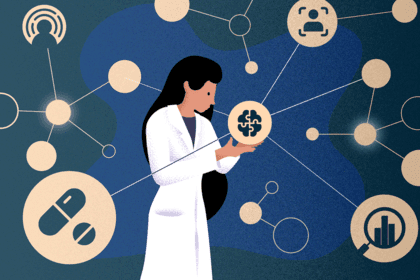
The programme shaping the future of mental health policy in Africa
A leadership programme, backed by Wellcome, aims to empower and train policymakers to improve mental health policy and outcomes in Africa by focusing on local needs and embedding lived experience.

Jack Cole / Wellcome
Summary
- The Africa Mental Health Leadership Programme is a partnership between the Africa Centres for Disease Control and Prevention, the African Field Epidemiology Network, and CBM Global Disability Inclusion, supported by Wellcome.
- It will provide tailored training and support to public health professionals and policymakers in Africa, helping them advocate for mental health and develop better policies, ultimately improving outcomes.
- It aims to create a cohort of African mental health leaders empowered to create change in their communities and countries.
- The programme will initially run from June 2024 to 2027, with evaluations throughout.
Global political support for mental health has grown over the past decade. Mental health is now part of the UN Sustainable Development Goals and all 194 World Health Organization Member States have signed the Comprehensive Mental Health Action Plan 2013–2030.
Yet, progress remains slow, and more action is needed to create meaningful change.
There must be stronger coordination and commitment to adopt and expand new and better interventions driven by local priorities, especially in low- and middle-income countries where the need is greatest.
This is particularly urgent in Africa. Over 116 million people in Africa were estimated to be living with a mental health condition before the Covid-19 pandemic – a number likely higher now.
Yet, only about 0.4 percent to 5 percent of public money is spent on mental health in Africa. This makes it difficult to expand the mental health workforce and improve services.
Finding better solutions requires greater political support and strategies tailored to local needs.
That's why a new mental health leadership programme for policymakers, led by the Africa Centres for Disease Control and Prevention, could be transformative.
It aims to train policymakers to advocate for mental health across the continent and develop better policies – creating the next generation of mental health leaders.
The challenge with existing mental health interventions
Breakthroughs in mental health have led to innovative new treatments and interventions. But they have their challenges, and cost-effective options for low- and middle-income countries are limited.
One of the biggest challenges is that many mental health interventions aren’t scalable globally. They require expensive infrastructure, specialised training and ongoing support that many countries, including those in Africa, can’t provide.
Moreover, many interventions lack input from people with lived experience of mental health challenges. As a result, they might not always help those they are intended for.
For example, in some African communities, traditional or alternative mental health treatments are often preferred, or people avoid treatment due to stigma and a lack of awareness about mental health. Understanding this context is the key to providing effective interventions.
Therefore, the focus must be on developing affordable, adaptable solutions tailored to the unique challenges of different communities and countries across Africa.
A new era for mental health policy in Africa
The Africa Centres for Disease Control and Prevention launched its first mental health strategy in 2023. This recognises the unique priorities of African Union Member States and aims to strengthen mental health systems, improve access to services and reduce stigma.
A key priority of this was the Africa Mental Health Leadership Programme. In partnership with the African Field Epidemiology Network and CBM Global Disability Inclusion, with support from Wellcome, the programme aims to train policymakers across the continent to advocate for mental health and address local needs.
The programme will run over three years and has four main strands:
- The Kofi Annan Global Health Leadership Programme, a prestigious course enhancing public health leadership skills that will embed mental health to train 15 mental health fellows.
- The Africa Field Epidemiology Network, a professional development course that will incorporate mental health to train 60 field epidemiologists in a nine-month intermediate course and 20 senior public and mental health epidemiologists in a two-year advanced course.
- Expanding existing mental health short courses in Cairo and Ibadan to Kenya, Zimbabwe and Côte d'Ivoire. The two-week leadership courses aim to train 240 public health professionals.
- Building the capacity of civil society organisations working on mental health, including those led by people with lived experience. This will also help to create networks for programme participants to share knowledge and best practices.
According to Dr Mohammed Abdulaziz, Head of Disease Control and Prevention at the Africa Centres for Disease Control and Prevention, the leadership programme marks the beginning of systemic change.
“All of these initiatives address key public health priorities essential for tackling the mental health challenges faced by our Member States,” he says.
“The Kofi Annan Fellowship, for example, will give policymakers the leadership skills required to discuss and advocate for mental health at the highest level of governance,” says Dr Mohammed.
“The Africa Field Epidemiology Network equips leaders to embed mental health in the technical aspects of public health, like outbreak response and surveillance.”
And the short courses and capacity building, he explains, will train a diverse group of public health professionals and allies – from journalists to activists – and create a network of like-minded people to champion mental health in their countries.
In some African countries, up to 90% of people with mental health problems don't receive treatment. This means we are still far from achieving the global goal of achieving universal health coverage and health equity by 2030.
For Dr Mohammed, the most exciting aspect of the leadership program is its potential to establish health equity in Africa.
“We are trying to change a health system so that, for example, a woman in any village in Africa who has depression can access quality care and treatments and live well.”
How lived experience will shape mental health policy in Africa
Lived experience is embedded throughout the leadership programme.
Experts with lived experience helped design the curriculum and are involved at every level of governance. They deliver modules, attend courses and advise on reasonable adjustments for people with mental health challenges for equitable participation.
This ensures the programme addresses the real needs and challenges of those affected by mental health issues in Africa, ultimately leading to more effective solutions.
It also helps future mental health leaders understand the importance of involving people with lived experience in developing mental health policies.
According to Michael Njenga, CBM Global Africa Regional Mental Health Advisor, this will help shift the balance of power in mental health policy.
“It will help restore voice, power and choice to people with lived experience through meaningful participation and inclusion,” Michael says. “It’s about giving people agency and autonomy and enabling them to contribute to decision-making and develop solutions to the issues most pertinent to them.”
The leadership programme, and its inclusion of people with lived experience, is guided by international human rights law and policies, ensuring future policies are based on best practices.
“Mental health is not a stand-alone issue,” Michael explains. “If someone is not experiencing good mental health and wellbeing, it can impact their education, employment and their ability to enjoy an adequate standard of living. This programme provides an opportunity to train leaders to develop policies that respond to these issues in Africa and deliver services firmly grounded in human rights.”
As someone with lived experience of mental health challenges who grew up in rural Kenya, Michael understands the difficulties in accessing appropriate support and care. He hopes the leadership programme will help change that.
“The programme will restore dignity and autonomy for people with mental health challenges and help transform mental health services across Africa,” says Michael.
What’s next for the Africa Mental Health Leadership Programme?
The programme will run from June 2024 to 2027 initially, with evaluations to measure its impact throughout.
It aims to build a strong foundation and establish a lasting framework for mental health leadership and policy across the continent.
If successful, the programme will serve as a sustainable and adaptable model for supporting future mental health leaders in Africa. It will create a network of decision-makers who can drive progress based on local priorities, with the potential to transform outcomes across generations.
"At Wellcome, we aim to help shape mental health policy so that everyone, everywhere can access the support they need. This leadership programme exemplifies the need for evidence-based, locally-led solutions – and has the potential to transform many lives."
Contact us
For more information on the Africa Mental Health Leadership Programme, contact Alex Callaghan, Policy Lead, at A.Callaghan@wellcome.org.
We’re funding research to help create transformative change in early intervention for anxiety, depression and psychosis.
There are currently no open funding opportunities for Mental Health. Learn more about the funding we provide.


